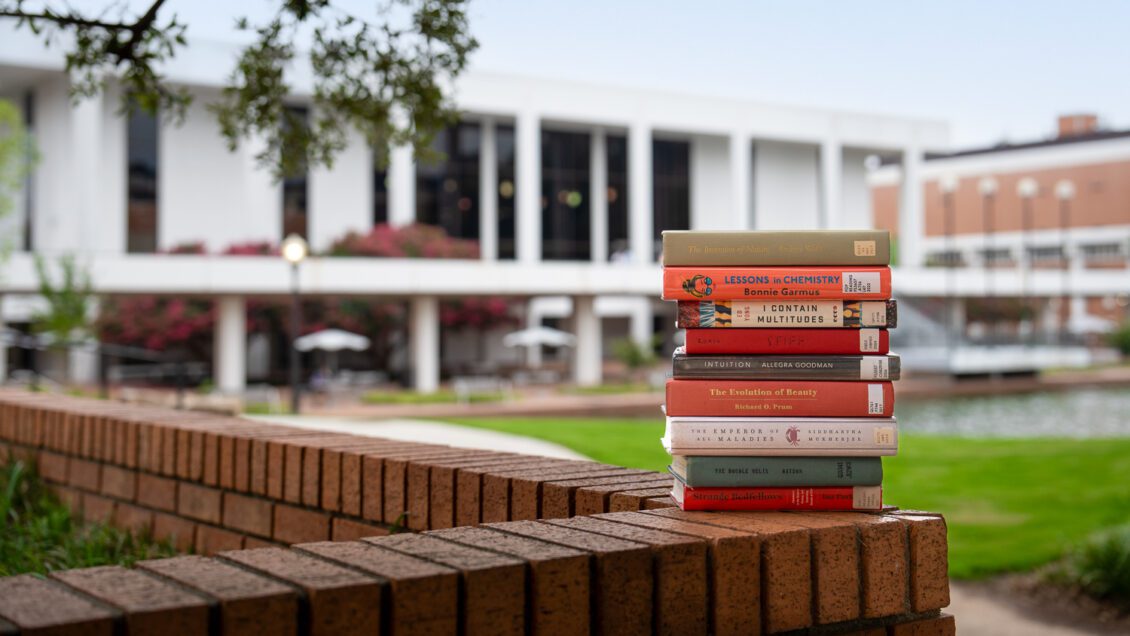For all those who love to read, August 9 is a day to celebrate. It’s National Book Lovers Day.
We asked some Clemson University College of Science faculty for their favorite science-related books so that you can add some fresh titles to your TBR (to be read) list.
“The Evolution of Beauty: How Darwin’s Forgotten Theory of Mate Choices Shapes the Animal World,” Richard O. Prum
Associate Professor of Chemistry Daniel Whitehead: “This is a great book about evolution and mate choice in tropical birds. Excellent science reading!”
“Stiff: The Curious Lives of Cadavers,” Mary Roach
Kimberly Paul, associate professor in the Department of Genetics and Biochemistry: “Man, this was so good if you are interested in medicine and medical fields. It is also irreverent and laugh out loud funny. Makes you think about the life your body might take after you’ve … left the building. Her other books are great too!”
“Storm in a Teacup: The Physics of Everyday Life,” Helen Czerski
Amy Pope, Department of Physics and Astronomy Principal Lecturer: “In a world where physics is often seen as intimidating, this book explores the world of everyday objects like toasters and teacups. Czerski effortlessly uses these familiar items as a launchpad to demystify complex scientific concepts, making them accessible to readers of all backgrounds. ‘Storm in a Teacup’ beautifully blends science, storytelling and humor. It captures the reader’s imagination and presents scientific concepts in a fun and engaging way. Whether you are a seasoned physicist or simply have a curiosity about the world around you, this book serves as an accessible gateway into the wonders of physics.”
“A Land Remembered,” Patrick Smith
College of Science Dean Cynthia Y. Young: “I’m a third generation Floridian, and it’s a story that illustrates the state’s natural ecosystems (plants, animals and humans) through the lens of an extended family from the 1850s through the 1960s.”
“The Double Helix: A Personal Account of the Discovery of the Structure of DNA,” James D. Watson.
Chemistry Professor Carlos Garcia: “Simple and nice story about DNA structure and how Watson and Crick treated Rosalind Franklin.”
The Foundation Science Fiction Series, Isaac Asimov
Alex Feltus, professor in the Department of Genetics and Biochemistry and faculty member at the Clemson Center for Human Genetics: “These books provide a centuries view into the future of our species. The story is fun and exciting, but the discussions of modeling human behavior at a galactic scale has motivated me to do science since I read these in the 1970s. A lot of the tech that exists today (AI, robotics, etc.) is described and projected to construct a better, albeit complex, future for our species. I love our species, and science and technology can help us fix massive problems of inequity, hunger, disease and so much more!
“Strange Bedfellows,” Ina Park
Kristi Whitehead, biological sciences senior lecturer: “‘Strange Bedfellows’ is probably my absolute favorite. It deals with all aspects of STIs (sexually transmitted infections), including aspects of their history, their treatments, societal responses and various impacts of stigma. It is extremely well written, easy to read, informative, and it contains some humor.”
“Lessons in Chemistry”, Bonnie Garmus
College of Science Associate Dean Stephen Creager: “I really enjoyed it!” This novel follows Elizabeth Zott, a gifted research chemist in 1960s California whose career takes a detour when she becomes the unlikely star of a beloved TV cooking show.
“How Not to Be Wrong: The Power of Mathematical Thinking,” Jordan Ellenburg
Department of Physics and Astronomy Professor Chad Sosolik: “This book is my current favorite because it explores, in an accessible way, some of the basic misconceptions we (including trained physicists!) may harbor regarding extrapolation of data, probability and even dicey existential topics.”
“The Wonderful Mr. Willughby: The First True Ornithologist,” Tim Birkhead
Daniel Whitehead: “I am a chemist by training, but I love birds, nature writing and history. This book is a lovely blend of all three and tells the history of a 17th century naturalist. I thoroughly enjoyed it.”
“Antarctica,” Kim Stanley Robinson
Kimberly Paul: “More about science and exploration as an endeavor (Antarctica is the ‘Continent of Science,’ after all). Also about climate change and environmentalism. A compelling and entertaining read. Shows how politics and science try to be separate but inevitably get entangled.”
“I Contain Multitudes,” Ed Yong
Kristi Whitehead: “It deals with various aspects of host-microbe interactions. Although it focuses on the human microbiome, it includes discussions of animal-microbe and insect-microbe interactions. It is also extremely well written.”
Other recommendations:
- “The Bastard Brigade: The True Story of the Renegade Scientists and Spies Who Sabotaged the Nazi Atomic Bomb,” Sam Kean
- “Intuition,” Allegra Goodman
- “The Martian,” Andy Weir“Contact,” Carl Sagan
- “The Emperor of All Maladies,” Siddhartha Mukherjee
- “The Invention of Nature,” Andrea Wulf
Get in touch and we will connect you with the author or another expert.
Or email us at news@clemson.edu

